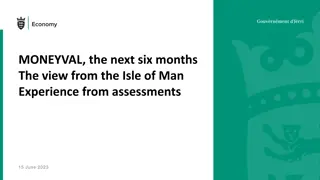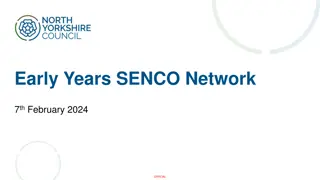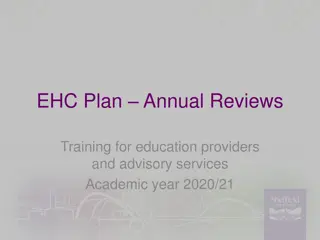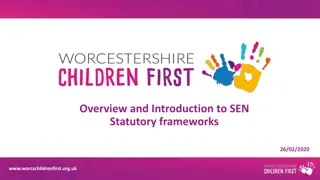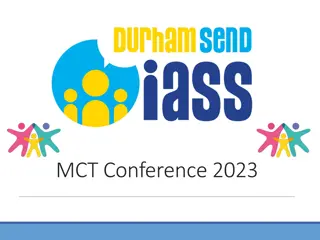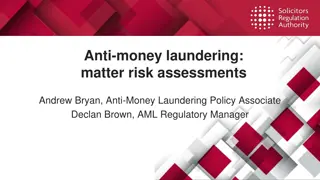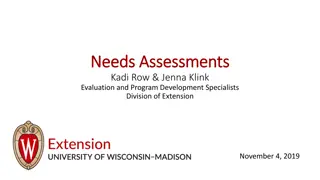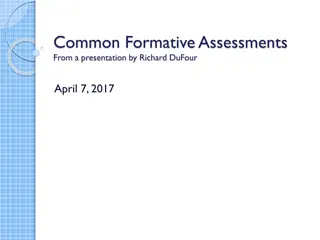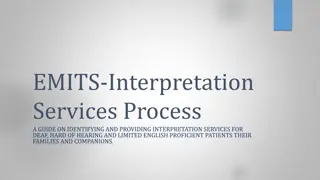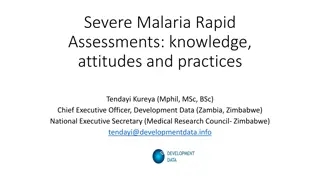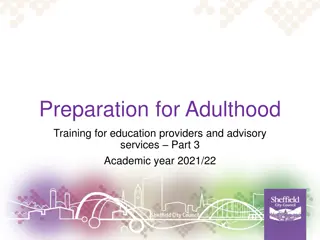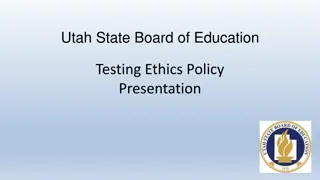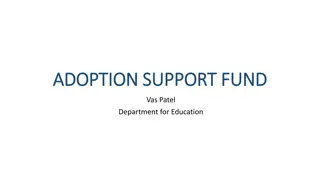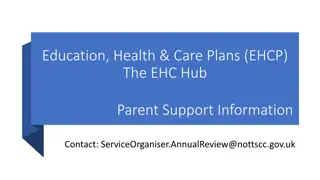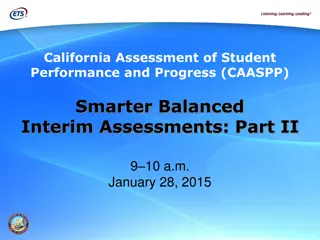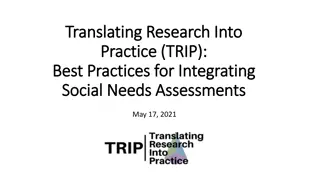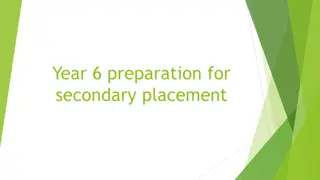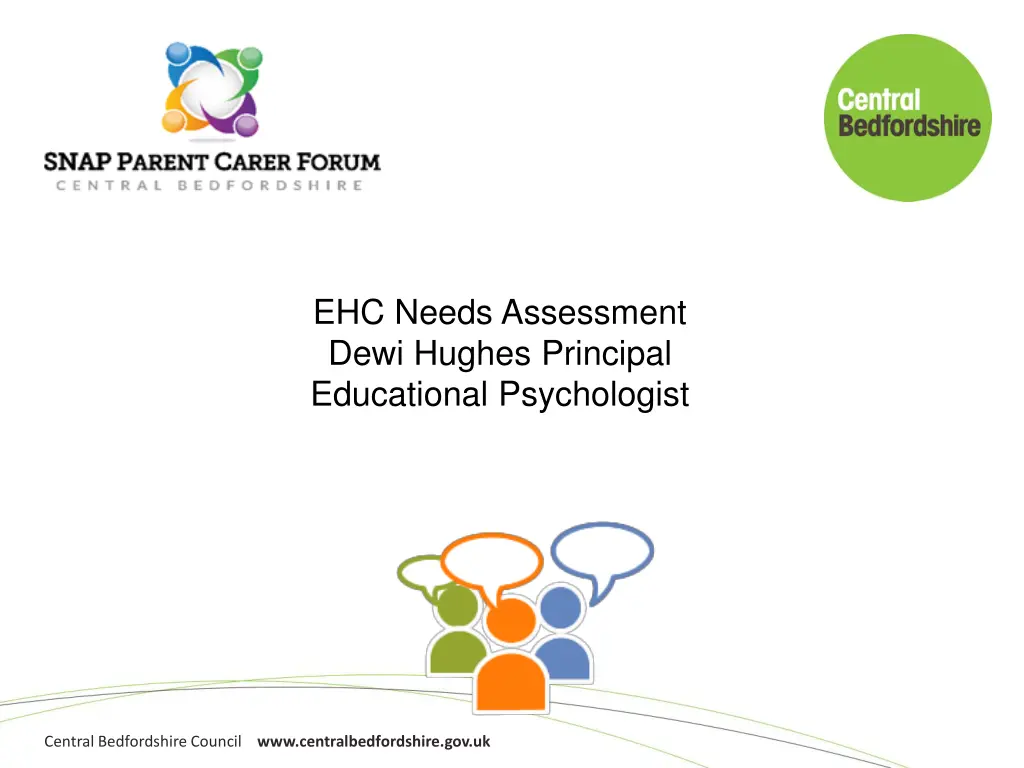
Understanding Special Educational Needs and Disabilities (SEND) Assessment Process
Learn about the SEND assessment process in Central Bedfordshire, including how to identify if a child may have SEND, who can help, and the graduated approach to providing support. Find resources and next steps for caregivers and educators.
Uploaded on | 0 Views
Download Presentation

Please find below an Image/Link to download the presentation.
The content on the website is provided AS IS for your information and personal use only. It may not be sold, licensed, or shared on other websites without obtaining consent from the author. If you encounter any issues during the download, it is possible that the publisher has removed the file from their server.
You are allowed to download the files provided on this website for personal or commercial use, subject to the condition that they are used lawfully. All files are the property of their respective owners.
The content on the website is provided AS IS for your information and personal use only. It may not be sold, licensed, or shared on other websites without obtaining consent from the author.
E N D
Presentation Transcript
EHC Needs Assessment Dewi Hughes Principal Educational Psychologist Central Bedfordshire Council www.centralbedfordshire.gov.uk
Todays Workshop Item 1 Welcome and introduction 2 SEND Local Offer SEND Support Graduated Approach 3 4 SEND Service 5 EHC Needs Assessment 6 Who can help you 7 Next steps Further Training 2 Central Bedfordshire Council www.centralbedfordshire.gov.uk
SEND Local Offer http://www.centralbedfordshire.gov.uk/children/sen- disability/landing.aspx Central Bedfordshire Council www.centralbedfordshire.gov.uk
Think the child you are caring for has SEND? If the child attends a pre-school, meet with their teacher or key worker If the child is at school, meet with their teacher about your concerns. The teacher will be able to tell you what they can do to help your child. You could also speak to the school's special needs co-ordinator (SENCO), who organises extra help for children with SEND If the Young Person is at college, meet with the person responsible for SEND (usually called the SENCO or learning support co-ordinator) You may get further advice from the SENDIASS team https://www.centralbedfordshire.gov.uk/info/15/sen_and_disability_- _local_offer/141/central_bedfordshire_special_educational_needs_and_disability_information_a dvice_and_support_service Central Bedfordshire Council www.centralbedfordshire.gov.uk
Continued: At your meeting Say why you think your child may have SEND Ask whether your child has more difficulty learning than other children their age Ask what the setting/school/college can do to help your child Ask what you may be able to do to help when your child is at home Central Bedfordshire Council www.centralbedfordshire.gov.uk
Graduated Approach If they agree that your child has SEND they should take a graduated approach. This means they will offer your child additional support and set targets (or outcomes) to be achieved. They will review your child's progress regularly, at least 3 times per year, and if necessary change the level or support or the way it is provided. This will all be discussed with you and must be recorded in Central Bedfordshire, we recommend use of a document called a SEND Support Plan Outside agencies to be called in to support the setting and provide strategies to support the child Central Bedfordshire Council www.centralbedfordshire.gov.uk
SEND Support Schools in Central Bedfordshire expressed a wish to retain a graduated approach to meeting special educational needs. For those children and young people who do not require an EHC Needs Assessment, there are 2 stages of SEN support: Stage 1: some additional or different intervention within the school or setting will be required to enable the child / young person to access independent earning and the curriculum. Central Bedfordshire Council www.centralbedfordshire.gov.uk
SEND Support Stage 2: builds on the arrangements for Stage 1 and draws on more detailed approaches, more frequent review and more specialist expertise in successive cycles in order to match interventions to the needs of children and young people. For higher levels of need, schools should have arrangements in place to draw on more specialised assessments from external agencies and professionals. Where it is decided to provide a pupil with SEND support, the teacher and the SENCO should consult the parent and pupil. Settings should work with parents and young people to create a SEND Support Plan at this point. Central Bedfordshire Council www.centralbedfordshire.gov.uk
If your child is identified as having SEND Where a pupil is identified as having SEND, schools should take action to remove barriers to learning and put effective special education provision in place. SEND support should take the form of a four part cycle assess, plan, do and review. Through this cycle, actions should be revisited, refined and revised to ensure the pupil is making progress and the identified outcomes are achieved Central Bedfordshire Council www.centralbedfordshire.gov.uk
Timeline Once LA receive a request for an EHC Needs Assessment The LA have 6 weeks to make a decision (if answer is no Parents have a right to Appeal to the SEND Tribunal). At 16 weeks the LA must make decision whether to issue EHC Plan or not (if answer is no Parents have the right to Appeal to the SEND Tribunal). The LA must issue a Draft Plan at 18 weeks - Parent has 15 days for comment. Finalisation of EHC Plan is 20 weeks from the EHC Needs Assessment request (if unhappy with content Parents have a right to Appeal). Central Bedfordshire Council www.centralbedfordshire.gov.uk
Entitlement Any parent or education setting can request an EHC Needs Assessment under the Children and Families Act 2014. The Local Authority s function to involve children/young people. http://www.centralbedfordshire.gov.uk/children/sen- disability/education/child-sen.aspx Link to letter template and school referral paperwork Does not have to be the educational setting who requests this. Central Bedfordshire Council www.centralbedfordshire.gov.uk
EHC Needs Assessment Under the Children & Families Act 2014: the Local Authority must secure an EHC Needs assessment for a child/young person if the Authority is of the opinion that : - (a) The child or young person has or may have special educational needs; and (b) It may be necessary for special educational provision to be made for the child or young person in accordance with an EHC Plan. Central Bedfordshire Council www.centralbedfordshire.gov.uk
What is necessary? The word necessary falls somewhere between really useful and essential. What is necessary is a matter to be deduced rather than defined. It s determination will vary according to circumstances of the particular case and may well involve a considerable degree of judgement. It does mean all requests must be considered. Central Bedfordshire Council www.centralbedfordshire.gov.uk
Special Educational Provision has been redefined. Healthcare provision or social care provision which educates or trains a child or young person is to be treated as special educational provision (instead of healthcare provision or social care provision) . Central Bedfordshire Council www.centralbedfordshire.gov.uk
What about high-functioning children with autism ? Code of Practice It should not be assumed that attainment in line with chronological age means that there is no learning difficulty or disability. Some learning difficulties occur across a range of cognitive ability and left unaddressed may lead to frustration, which may manifest itself as disaffection, emotional or behavioural difficulties . Central Bedfordshire Council www.centralbedfordshire.gov.uk
Who do we need advice from? Advice should be provided by: Parent Head/SENCO Educational Psychologist Medical Social Care Hearing & visual impairment where relevant ASD Advisory teacher where relevant CAMHS as part of medical where relevant Central Bedfordshire Council www.centralbedfordshire.gov.uk
The EHC Plan When You Get It The EHC Plan is a complex twelve section document (as section H is in 2 parts). Section A parent s/child s views Section B Child or young person s Special Educational Needs Section C -Health needs related to their SEN Section D Social Care needs related to their SEN Section E SEN outcomes Section F Special Educational Provision Section G Health provision Section H1 Social Care provisions resulting from Section 2 of the Chronically sick & Disabled Persons Act 1970 Section H2 Social Care Provision reasonably required Section I Educational Placement Section J Personal Budget Section K Appendices and Advice/Information The Educational sections of an EHC Plan are Sections B, F & I B, F and I are the only sections which are legally enforceable Right of Appeal to the SEND Tribunal Central Bedfordshire Council www.centralbedfordshire.gov.uk
The EHC Plan When You Get It Sections B, F & I have to be separately labelled. If it is not clear what is educational provision. All sections must be specific, detailed and quantified. Lack of specificity compromises legal enforceability - how long or how often is access to? Benefits from? Remember, the redefinition of Special Educational needs (Section 21(S)). This means waking day curriculums, behavioural therapies, life skills e.g. travel training should be included in Section F and does not require part funding from health or social care. Central Bedfordshire Council www.centralbedfordshire.gov.uk
Why should parents appeal to the SEND Tribunal? Appealing to the SEND Tribunal levels the playing field and will give parents equality with Central Bedfordshire. How do I Appeal? Download Appeal forms from the SEND Tribunal website, file together with your Reasons for Appeal . Where do parents Appeal? SEND Darlington office The SEND Tribunal process is the same for all SEN appeals Refusal to undertake an EHC Needs Assessment Refusal to issue an EHC Plan Failure to correctly transfer a Statement to an EHC Plan EHC Plan content (sections B,F & I) Notification of Cease to Maintain Statement or EHC Plan Central Bedfordshire Council www.centralbedfordshire.gov.uk
Support for Parents Central Bedfordshire Special Educational Needs & Disability Information, Advice & Support Service (SENDIASS) Telephone: 0300 300 8088 Email: sendiass@centralbedfordshire.gov.uk SNAP Parent Carer Forum (PCF) Telephone: 07984 545044 Email: admin@snappcf.org.uk SEND Team Telephone: 0300 300 8356 Email: statass@centralbedfordshire.gov.uk Central Bedfordshire Council www.centralbedfordshire.gov.uk
Support for Parents Contact https://contact.org.uk/ Council For Disabled Children https://councilfordisabledchildren.org.uk/resources-and-help IPSEA https://www.ipsea.org.uk/ehc-needs-assessments SOS SEN https://www.sossen.org.uk/ Code of Practice 2015 https://assets.publishing.service.gov.uk/government/uploads/sy stem/uploads/attachment_data/file/398815/SEND_Code_of_Pra ctice_January_2015.pdf Central Bedfordshire Council www.centralbedfordshire.gov.uk

